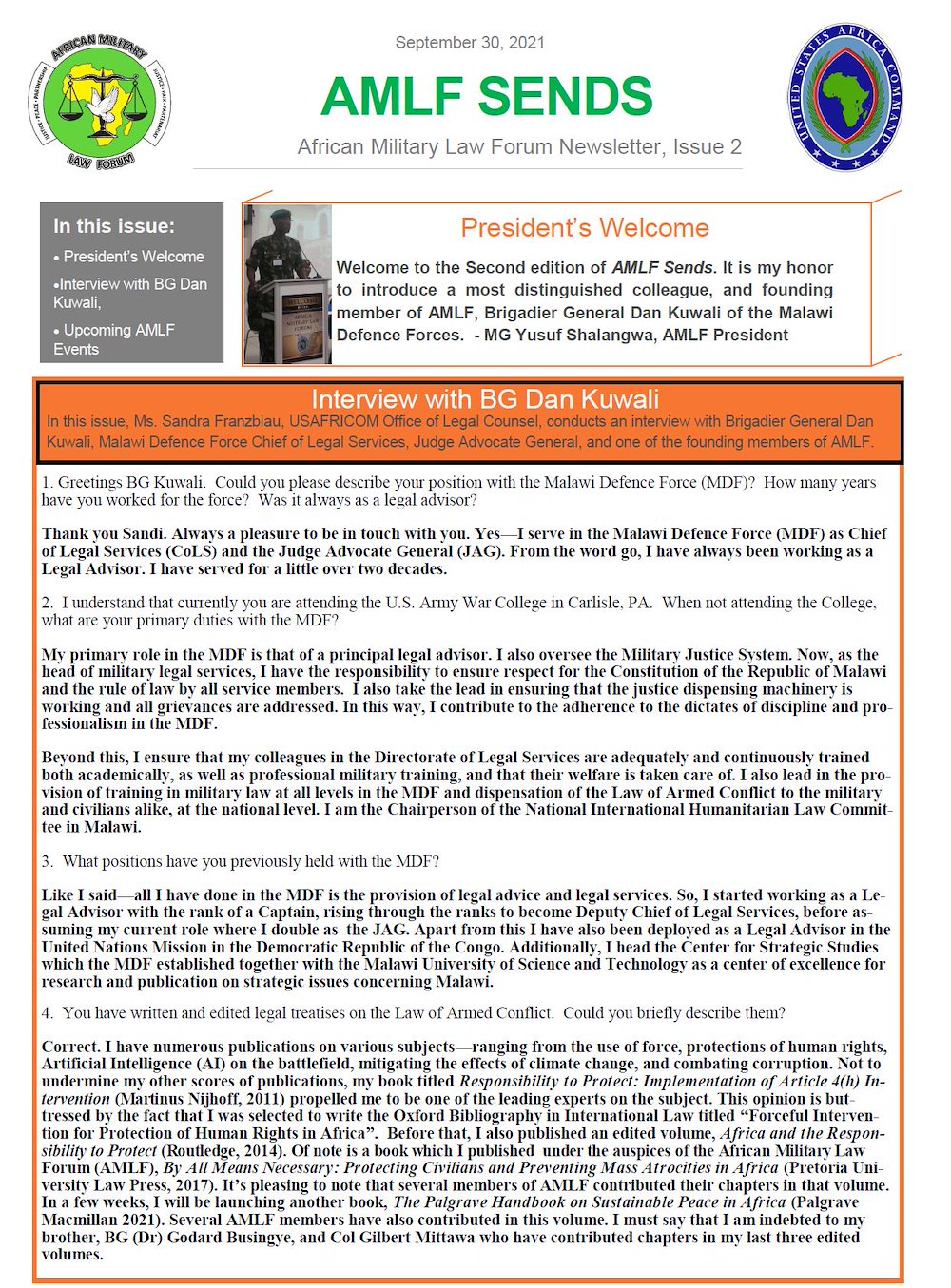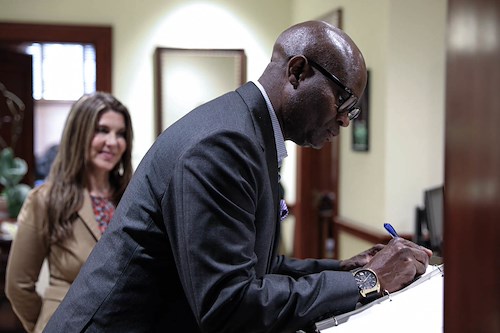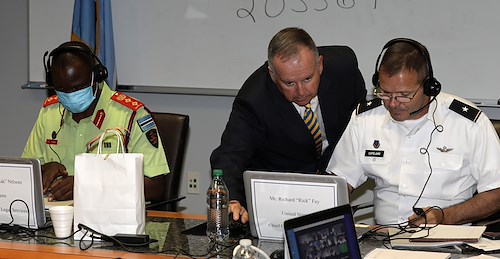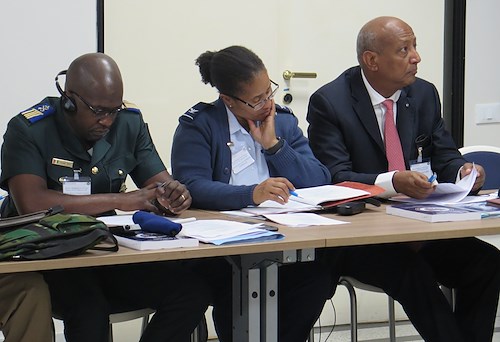African Military Law Forum Sends, Issue 2
 READ: African Military Law Forum Newsletter, Issue 2
READ: African Military Law Forum Newsletter, Issue 2
* Cette publication est disponible en français
** Esta publicação está disponível em português
President’s Welcome
"Welcome to the Second edition of AMLF Sends. It is my honor to introduce a most distinguished colleague, and founding member of AMLF, Brig. Gen. Dan Kuwali of the Malawi Defence Forces."
- MG Yusuf Shalangwa, AMLF President
 Brig. Gen. Yusuf Ibrahim Shalangwa, Nigeria, Brig. Gen. Dan Kuwali, Malawi, and Brig. Gen. Paul Dikita Ilunga, Democratic Republic of Congo, listen to a presentation during the Africa Military Law Forum in Oberammergau, Germany, March 1, 2018. Interview with Brig. Gen. Dan Kuwali
Brig. Gen. Yusuf Ibrahim Shalangwa, Nigeria, Brig. Gen. Dan Kuwali, Malawi, and Brig. Gen. Paul Dikita Ilunga, Democratic Republic of Congo, listen to a presentation during the Africa Military Law Forum in Oberammergau, Germany, March 1, 2018. Interview with Brig. Gen. Dan Kuwali
 Brig. Gen. Yusuf Ibrahim Shalangwa, Nigeria, Brig. Gen. Dan Kuwali, Malawi, and Brig. Gen. Paul Dikita Ilunga, Democratic Republic of Congo, listen to a presentation during the Africa Military Law Forum in Oberammergau, Germany, March 1, 2018.
Brig. Gen. Yusuf Ibrahim Shalangwa, Nigeria, Brig. Gen. Dan Kuwali, Malawi, and Brig. Gen. Paul Dikita Ilunga, Democratic Republic of Congo, listen to a presentation during the Africa Military Law Forum in Oberammergau, Germany, March 1, 2018. In this issue, Ms. Sandra Franzblau, U.S. Africa Command Office of Legal Counsel, conducts an interview with Brig. Gen. Dan Kuwali, Malawi Defence Force Chief of Legal Services, Judge Advocate General, and one of the founding members of AMLF:
1. Greetings Brig. Gen. Kuwali. Could you please describe your position with the Malawi Defence Force? How many years have you worked for the force? Was it always as a legal advisor?
Thank you Sandi. Always a pleasure to be in touch with you. Yes—I serve in the Malawi Defence Force as chief of legal services and the Judge Advocate General. From the word go, I have always been working as a legal advisor. I have served for a little over two decades.
2. I understand that currently you are attending the U.S. Army War College in Carlisle, Pennsylvania. When not attending the College, what are your primary duties with the MDF?
My primary role in the MDF is that of a principal legal advisor. I also oversee the Military Justice System. Now, as the head of military legal services, I have the responsibility to ensure respect for the Constitution of the Republic of Malawi and the rule of law by all service members. I also take the lead in ensuring that the justice-dispensing machinery is working and all grievances are addressed. In this way, I contribute to the adherence to the dictates of discipline and professionalism in the MDF.
Beyond this, I ensure that my colleagues in the Directorate of Legal Services are adequately and continuously trained both academically, as well as professional military training, and that their welfare is taken care of. I also lead in the provision of training in military law at all levels in the MDF and dispensation of the Law of Armed Conflict to the military and civilians alike, at the national level. I am the Chairperson of the National International Humanitarian Law Committee in Malawi.
3. What positions have you previously held with the MDF?
Like I said—all I have done in the MDF is the provision of legal advice and legal services. So, I started working as a Legal Advisor with the rank of a Captain, rising through the ranks to become Deputy Chief of Legal Services, before assuming my current role where I double as the JAG. Apart from this I have also been deployed as a Legal Advisor in the United Nations Mission in the Democratic Republic of the Congo. Additionally, I head the Center for Strategic Studies which the MDF established together with the Malawi University of Science and Technology as a center of excellence for research and publication on strategic issues concerning Malawi.
4. You have written and edited legal treatises on the Law of Armed Conflict. Could you briefly describe them?
Correct. I have numerous publications on various subjects—ranging from the use of force, protections of human rights, Artificial Intelligence on the battlefield, mitigating the effects of climate change, and combating corruption. Not to undermine my other scores of publications, my book titled "Responsibility to Protect: Implementation of Article 4(h) Intervention" (Martinus Nijhoff, 2011) propelled me to be one of the leading experts on the subject. This opinion is buttressed by the fact that I was selected to write the Oxford Bibliography in International Law titled “Forceful Intervention for Protection of Human Rights in Africa." Before that, I also published an edited volume, Africa and the Responsibility to Protect (Routledge, 2014). Of note is a book which I published under the auspices of the African Military Law Forum, "By All Means Necessary: Protecting Civilians and Preventing Mass Atrocities in Africa" (Pretoria University Law Press, 2017). It’s pleasing to note that several members of AMLF contributed their chapters in that volume. In a few weeks, I will be launching another book, "The Palgrave Handbook on Sustainable Peace in Africa" (Palgrave Macmillan 2021). Several AMLF members have also contributed in this volume. I must say that I am indebted to my brother, Brig. Gen. (Dr.) Godard Busingye, and Col. Gilbert Mittawa, who have contributed chapters in my last three edited volumes.
5. You were elected to represent the first leadership positions developed in the African Military Law Forum Executive Council. You currently serve on the AMLF Board of Trustees. Could you describe AMLF and what you hope other military legal professionals will learn from the AMLF?
That’s correct. I have been with the AMLF right from its inception. I am one of the founding members. I am currently the Chairperson of the Advisory Council. To start with, AMLF is a group of personnel who deal with military law in one way or the other. What I am saying here is that AMLF is not only limited to military lawyers or lawyers in general, but rather to all who are involved in military law — be it combatant commanders or civilians, whether African or non-African. Remember, the name is African Military Law Forum. The word Africa there just qualifies the regional focus of this legal-minded group. We need as many people as possible to be members of the AMLF so that we can share experiences and lessons learned to promote the rule of law and military justice on the continent. Ladies are particularly encouraged to take leading roles.
6. Could you identify any area in your professional practice that you find particularly challenging?
You know, contrary to popular belief, military officers tend to be intellectually sophisticated, especially the range of problems they deal with and the diversity of fields of knowledge they draw from. Situational awareness requires that military officers should be ahead of the game. In this case, the challenges both in peacetime and during conflict are numerous. Presently, we are grappling with the question of legality and ethics of the use of Artificial Intelligence on the battlefield. Locating effective counter violent extremism strategies is another current problem. That reminds me, I developed a concept of counter violent extremism 'Ten Cs' strategy which is a soft power approach to eradicate extremism, focusing on Africa. Several practitioners and think tanks have picked it up and are applying it.
7. Have you deployed? Do you have any recommendations to those preparing to deploy?
Yes. I deployed as a peacekeeper in the UN Mission in DRC. To deploy as a peacekeeper, you need to religiously participate in the pre-deployment training — understand the concepts, understand the mandate, and involve yourself in situational awareness. As the eyes and ears of the UN, one needs to be vigilant, record and report all you can. It is also important to remember that your duty in a mission area is to protect the people, not to be part of the problem. So understand and be part of the implementation of preventive strategies for sexual exploitation and abuse on the ground.
8. If you could give advice to your younger self regarding working within the military and providing advice in particularly challenging areas, what would you say?
As an officer, you need to read widely and be well-rounded. Make progress in both academic and military education. Work hard, play hard, and pray hard. You need to live a balanced life. The battlefield is getting complicated. Contrary to Clausewitzian logic, I argue that both the nature and the character of war is changing. Contemporary and future hostilities will continue to be asymmetric against an amorphous enemy, driven by exclusivist identities as opposed to political or ideological agenda. So, an officer should be well-grounded in intellect, tact and battle fitness to be able to lead troops in highly complex and volatile environments.
9. How are you finding the U.S. Army War College?
Oh! That’s a very good question. First and foremost, I thank the U.S. Government and my country for nominating me to attend the U.S. Army War College. It’s truly an eye-opening experience. I have been selected to be in the Carlisle Scholars Program at the USAWC, which seeks to produce strategic leaders who not only understand the art or science of war, strategy, and policy, but also the politics and practice of it. Admission into the CSP is very competitive. The program integrates the seminar experience of traditional Professional Military Education with the autonomy of a self-directed fellowship . So it’s super exciting to engage with fellow officers at a deeper philosophical level.
Upcoming AMLF Events:
The AMLF Executive Committee and Advisory Council have been working throughout 2021 to plan the next AMLF General Meeting, currently scheduled for May 2022. Additionally, AMLF is starting a virtual speaker series in the near future to offer an opportunity for any interested African Military Legal Professional to log in on their computer and listen to and discuss a chosen legal topic of interest. African Military legal advisors wishing to learn more about AMLF, or participate in future AMLF events, should contact any of the AMLF leaders or the U.S. Africa Command Office of Legal Counsel through the U.S. Embassy in their respective countries.




